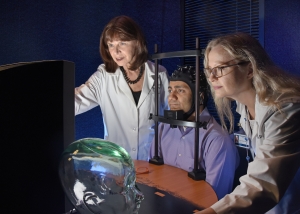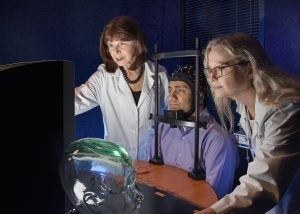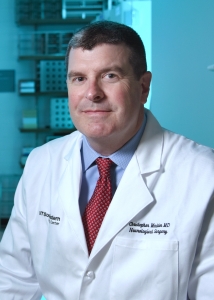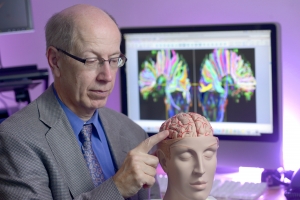
 There is a “grand expedition” underway in Dallas…and it is bringing together the best and brightest in science and medicine. I had an opportunity to hear all about it recently and take an incredible tour in Dallas, Texas.
There is a “grand expedition” underway in Dallas…and it is bringing together the best and brightest in science and medicine. I had an opportunity to hear all about it recently and take an incredible tour in Dallas, Texas.
Some of the greatest minds in neurological research, treatment and care have joined forces at the Peter O’Donnell Jr. Brain Institute at The University of Texas Southwestern Medical Center in Dallas. They have a singular long-term goal – to explore the remaining uncharted territory of what is recognized as the ultimate frontier in medicine – the human brain. To reach that goal, these experts are working to unlock the secrets of how the brain works so that their findings can be used to prevent and cure brain-related diseases and injuries.
Forging the trail on this expedition are more than 300 faculty members and an overall staff of 1,500. The team is made up of researchers, physicians, psychologists, nurses, clinicians, care-givers and other health care professionals. Their specialty areas range from traumatic brain injury and neuro-oncology to epilepsy and stroke. Since the creation of the Brain Institute in 2015, they have created a new paradigm for brain research.
The institute complements UT Southwestern Medical Center’s reputation as a leader in neuroscience. A $36 million gift from the O’Donnell Foundation helped launch the institute and accelerate the research. The committed team there doesn’t just want to find the causes of brain-related injuries and diseases, they want to prevent them.
Institute executives call this journey an “expedition” because the brain is one of the last unmapped frontiers in medicine. Executive Director Chris Madden, M.D., says that research and medicine are now “at the threshold of being sophisticated enough to unravel what in the past has been deeply mysterious.”
The largest statewide database for tracking concussions in young athletes now exists at the institute and it has received international attention and media coverage. The question in my mind is, “How many Texans know about this?”
The Brain Institute database holds athletic concussion incident reports from high schools and middle schools in about a dozen sports. A centrally located registry has been created and all information gathered from an incident is captured for research and analysis. This state registry could ultimately lead to development of a national registry.
Researchers have discovered that by examining toxic proteins that form in the brain, they

Dr. Christopher Madden is clinical director of the O’Donnell Brain Institute at UT Southwestern Medical Center in Dallas. Photo courtesy of UT Southwestern Medical Center.
can learn much more about Alzheimer’s and various types of dementia. They can determine, for instance, how quickly Alzheimer’s disease will spread and often predict various types of dementia that are likely to occur in an individual. The work they’ve already done will lead to more accurate diagnoses of Alzheimer’s disease and other dementias. Currently, individuals can voluntarily have their brains scanned and analyzed. This is done so that the data can be measured once and then on an annual basis as an early detection option. Any sign of decline in cognitive agility could result in treatment or therapy as a way to stop or slow any additional decline.
This incredible work has also led to the discovery of two core genes that control how much an individual sleeps and how much of the sleep is deep sleep – the kind that is so beneficial to a healthy body. Lack of enough deep sleep is a contributor to conditions such as post-traumatic stress disorder. The data gathered is used in many ways such as to determine what triggers dreams and how sleep works. The work they are doing will likely result in better sleep disorder treatments and the development of new sleep-regulating drugs.
The O’Donnell Brain Institute is making history as well in the area of medicine and patient care. While the institute’s ultimate goal is to find cures for brain disease and disorders, a short-term goal is to develop the infrastructure researchers and physicians must have. And, although the institute currently has a significant nucleus of talent, it must continue to “recruit up.” Bringing in the best of the best is important because a world-class faculty will help the institute rank at the top of similar centers globally.
“There are people at the medical school in Dallas who dream big dreams and are committed to a very ambitious plan related to neuroscience,” Madden said. “We’re shooting for the moon and hoping to make historic discoveries that will transform patient care.”
The Brain Institute in Dallas, Texas is, without doubt, one of the state’s premier assets.
* * * * * * * * * * * * * *
About the O’Donnell Brain Institute
- Six Nobel Prize winners are on staff at the institute.
- The institute boasts the largest team of researchers and physicians in North Texas, many of them internationally recognized.
- Teams of scientists and clinicians include experts in neurosciences, neurosurgery, neurology and neurotherapeutics, psychiatry and physical medicine and rehabilitation.
- Most of the institute’s in-patient care for brain and spine patients is provided at Zale Lipshy University Hospital, one of the world’s premier neurological diagnostic and treatment centers.
- Clinicians also provide patient care at UT Southwestern’s William P. Clements Jr. University Hospital, Parkland Health and Hospital System, the North Texas VA Hospital and Children’s Health.
- The institute collaborates with many UT Southwestern departments and divisions, from the Department of Neurological Surgery to the Department of Physical Medicine and Rehabilitation and with UT Southwestern’s Texas Institute for Brain Injury and Repair and the Alzheimer’s Disease Center.

Dr. Munro Cullum oversees the ConTex concussion registry at the O’Donnell Brain Institute, the nation’s largest statewide effort to assess the prevalence of concussions in high school sports. The data will fill a major gap in concussion research and may be a key step in creating a nationwide database for concussions. Photo courtesy of UT Southwestern Medical Center.
- More than 200 areas of specialty care, such as stroke, epilepsy and seizure disorders, multiple sclerosis, sleep and breathing disorders, autism and spine conditions are part of the institute.
- Advanced diagnostic capabilities and treatment options address the full spectrum of brain, spine, muscle, nerve and psychiatric disorders.
